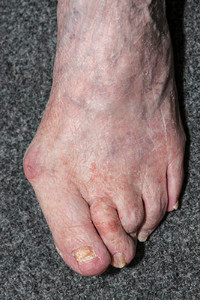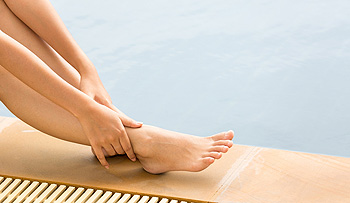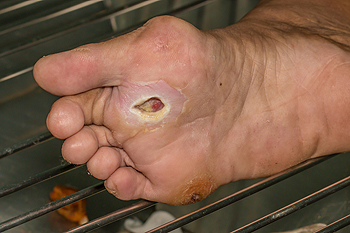Connect With Us
Blog
Items filtered by date: April 2020
Where Does a Bunion Develop?
 A bunion is defined as a noticeable, bony bump that extends on the side of the big toe. It can gradually form as a result of wearing shoes that do not have adequate room for the toes to move freely in. Additionally, genetic factors may play a significant role in developing a bunion. Common symptoms that many patients endure often include pain, redness on or around the affected area, and there may be considerable discomfort while walking. Mild relief may be felt when larger shoes are worn that can accommodate the bunion, and it may be beneficial to wear custom made orthotics. If you see the beginning signs of a bunion, it is suggested that you consult with a podiatrist who can help you to determine what the correct treatment method is for you.
A bunion is defined as a noticeable, bony bump that extends on the side of the big toe. It can gradually form as a result of wearing shoes that do not have adequate room for the toes to move freely in. Additionally, genetic factors may play a significant role in developing a bunion. Common symptoms that many patients endure often include pain, redness on or around the affected area, and there may be considerable discomfort while walking. Mild relief may be felt when larger shoes are worn that can accommodate the bunion, and it may be beneficial to wear custom made orthotics. If you see the beginning signs of a bunion, it is suggested that you consult with a podiatrist who can help you to determine what the correct treatment method is for you.
If you are suffering from bunion pain, contact Dr. David Ungar of Personal Foot Care. Our doctor can provide the care you need to keep you pain-free and on your feet.
What Is a Bunion?
Bunions are painful bony bumps that usually develop on the inside of the foot at the joint of the big toe. As the deformity increases over time, it may become painful to walk and wear shoes. Women are more likely to exacerbate existing bunions since they often wear tight, narrow shoes that shift their toes together. Bunion pain can be relieved by wearing wider shoes with enough room for the toes.
Causes
- Genetics – some people inherit feet that are more prone to bunion development
- Inflammatory Conditions - rheumatoid arthritis and polio may cause bunion development
Symptoms
- Redness and inflammation
- Pain and tenderness
- Callus or corns on the bump
- Restricted motion in the big toe
In order to diagnose your bunion, your podiatrist may ask about your medical history, symptoms, and general health. Your doctor might also order an x-ray to take a closer look at your feet. Nonsurgical treatment options include orthotics, padding, icing, changes in footwear, and medication. If nonsurgical treatments don’t alleviate your bunion pain, surgery may be necessary.
If you have any questions, please feel free to contact our office located in Farmington, MI . We offer the newest diagnostic and treatment technologies for all your foot care needs.
Reminder: When Was the Last Time...?
Why Are My Feet Swollen During Pregnancy?
 The joys and delights of pregnancy are often accompanied by sore and achy feet. This happens as a result of the growing fetus putting pressure on the lower extremities. The feet may become swollen and tired, which is why it can be beneficial to elevate them as often as possible during the day. Additionally, it may help to incorporate a gentle exercise program into your daily routine to keep your feet healthy during this time. Research has indicated the importance of avoiding high temperatures, as this can possibly help to diminish existing swelling. If you would like additional information about how to protect your feet during pregnancy, it is suggested that you schedule a consultation with a podiatrist.
The joys and delights of pregnancy are often accompanied by sore and achy feet. This happens as a result of the growing fetus putting pressure on the lower extremities. The feet may become swollen and tired, which is why it can be beneficial to elevate them as often as possible during the day. Additionally, it may help to incorporate a gentle exercise program into your daily routine to keep your feet healthy during this time. Research has indicated the importance of avoiding high temperatures, as this can possibly help to diminish existing swelling. If you would like additional information about how to protect your feet during pregnancy, it is suggested that you schedule a consultation with a podiatrist.
Pregnant women with swollen feet can be treated with a variety of different methods that are readily available. For more information about other cures for swollen feet during pregnancy, consult with Dr. David Ungar from Personal Foot Care. Our doctor will attend to all of your foot and ankle needs.
What Foot Problems Can Arise During Pregnancy?
One problem that can occur is overpronation, which occurs when the arch of the foot flattens and tends to roll inward. This can cause pain and discomfort in your heels while you’re walking or even just standing up, trying to support your baby.
Another problem is edema, or swelling in the extremities. This often affects the feet during pregnancy but tends to occur in the later stages.
How Can I Keep My Feet Healthy During Pregnancy?
- Wearing orthotics can provide extra support for the feet and help distribute weight evenly
- Minimize the amount of time spent walking barefoot
- Wear shoes with good arch support
- Wear shoes that allow for good circulation to the feet
- Elevate feet if you experience swelling
- Massage your feet
- Get regular, light exercise, such as walking, to promote blood circulation to the feet
If you have any questions please feel free to contact our office located in Farmington, MI . We offer the newest diagnostic and treatment technologies for all your foot and ankle needs.
Effective Methods for Daily Foot Maintenance
 Research has indicated the importance of maintaining everyday foot care. One of the first steps in accomplishing this is by wearing shoes that fit correctly. This may help to prevent uncomfortable foot conditions from developing, including bunions, hammertoes, or ingrown toenails. Additionally, it is beneficial to regularly trim the toenails, and the feet may feel better when they are washed daily. Many patients enjoy using a moisturizer on their feet, which may be helpful in preventing cracked heels. There are several ways to pamper your feet for general well-being, and it is suggested that you consult with a podiatrist who can guide you toward choosing methods that are right for you.
Research has indicated the importance of maintaining everyday foot care. One of the first steps in accomplishing this is by wearing shoes that fit correctly. This may help to prevent uncomfortable foot conditions from developing, including bunions, hammertoes, or ingrown toenails. Additionally, it is beneficial to regularly trim the toenails, and the feet may feel better when they are washed daily. Many patients enjoy using a moisturizer on their feet, which may be helpful in preventing cracked heels. There are several ways to pamper your feet for general well-being, and it is suggested that you consult with a podiatrist who can guide you toward choosing methods that are right for you.
Everyday foot care is very important to prevent infection and other foot ailments. If you need your feet checked, contact Dr. David Ungar from Personal Foot Care. Our doctor can provide the care you need to keep you pain-free and on your feet.
Everyday Foot Care
Often, people take care of their bodies, face and hair more so than they do for their feet. But the feet are a very important aspect of our bodies, and one that we should pay more attention to. Without our feet, we would not be able to perform most daily tasks.
It is best to check your feet regularly to make sure there are no new bruises or cuts that you may not have noticed before. For dry feet, moisturizer can easily be a remedy and can be applied as often as necessary to the affected areas. Wearing shoes that fit well can also help you maintain good foot health, as well as making it easier to walk and do daily activities without the stress or pain of ill-fitting shoes, high heels, or even flip flops. Wearing clean socks with closed shoes is important to ensure that sweat and bacteria do not accumulate within the shoe. Clean socks help to prevent Athlete’s foot, fungi problems, bad odors, and can absorb sweat.
If you have any questions please feel free to contact our office located in Farmington, MI . We offer the newest diagnostic and treatment technologies for all your foot and ankle needs.
Why Do Foot Ulcers Develop?
 Patients who have diabetes may be aware of the importance of properly caring for their feet. This can help to prevent the painful condition that is known as a diabetic foot ulcer. This type of wound may develop as a result of the inability of feeling a small cut on the foot, and it may quickly become infected. This can happen from elevated glucose levels in the blood, which may hinder the body’s capability to heal properly. Mild relief and proper healing may come from keeping weight off of the foot, and it may help to elevate it often. It is imperative that proper dressings are used as the healing process takes place, in addition to keeping the foot as clean and as dry as possible. If you have diabetes, it is strongly suggested that you seek the counsel of a podiatrist who can properly treat this condition.
Patients who have diabetes may be aware of the importance of properly caring for their feet. This can help to prevent the painful condition that is known as a diabetic foot ulcer. This type of wound may develop as a result of the inability of feeling a small cut on the foot, and it may quickly become infected. This can happen from elevated glucose levels in the blood, which may hinder the body’s capability to heal properly. Mild relief and proper healing may come from keeping weight off of the foot, and it may help to elevate it often. It is imperative that proper dressings are used as the healing process takes place, in addition to keeping the foot as clean and as dry as possible. If you have diabetes, it is strongly suggested that you seek the counsel of a podiatrist who can properly treat this condition.
Diabetic foot care is important in preventing foot ailments such as ulcers. If you are suffering from diabetes or have any other concerns about your feet, contact Dr. David Ungar from Personal Foot Care. Our doctor can provide the care you need to keep you pain-free and on your feet.
Diabetic Foot Care
Diabetes affects millions of people every year. The condition can damage blood vessels in many parts of the body, especially the feet. Because of this, taking care of your feet is essential if you have diabetes, and having a podiatrist help monitor your foot health is highly recommended.
The Importance of Caring for Your Feet
- Routinely inspect your feet for bruises or sores.
- Wear socks that fit your feet comfortably.
- Wear comfortable shoes that provide adequate support.
Patients with diabetes should have their doctor monitor their blood levels, as blood sugar levels play such a huge role in diabetic care. Monitoring these levels on a regular basis is highly advised.
It is always best to inform your healthcare professional of any concerns you may have regarding your feet, especially for diabetic patients. Early treatment and routine foot examinations are keys to maintaining proper health, especially because severe complications can arise if proper treatment is not applied.
If you have any questions, please feel free to contact our office located in Farmington, MI . We offer the newest diagnostic and treatment technologies for all your foot care needs.


